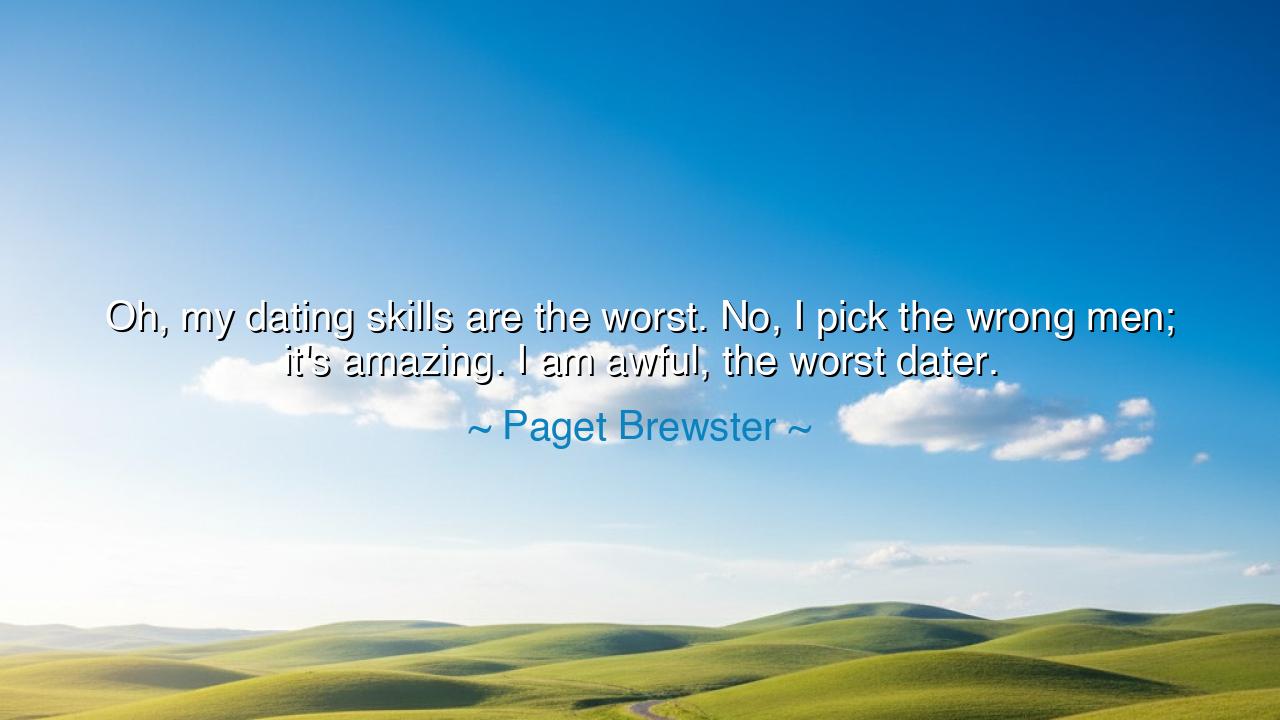
Oh, my dating skills are the worst. No, I pick the wrong men;
Oh, my dating skills are the worst. No, I pick the wrong men; it's amazing. I am awful, the worst dater.






In the candid and self-reflective words of Paget Brewster, there resounds a truth that is both humorous and deeply human: “Oh, my dating skills are the worst. No, I pick the wrong men; it’s amazing. I am awful, the worst dater.” Though her tone may carry laughter, beneath it lies a note of vulnerability and wisdom — the recognition that the path to love is often strewn with mistakes, illusions, and lessons learned through pain. Her confession is not merely about failed romance; it is about the fallibility of the heart, the strange way that even the intelligent, the wise, and the good-hearted can falter when confronted by desire and hope. In her humility, Paget speaks not only for herself, but for all who have loved unwisely yet refused to surrender the dream of connection.
Paget Brewster, known for her wit, warmth, and sharp intelligence, offered these words not as a lament, but as an honest reckoning. She acknowledges her imperfection in a culture obsessed with performance — even in love. The “worst dater” is not she who fails to find love, but she who dares to try again despite her failures. Her humor conceals a deeper truth: that to love is to risk humiliation, and that wisdom in love is not measured by success, but by courage. Her words remind us that the heart, though often misled, is noble in its persistence. Every wrong choice, every misguided affection, is not simply error — it is apprenticeship in the sacred art of discernment.
From the dawn of time, even the greatest souls have faltered in matters of the heart. Consider Cleopatra, queen of Egypt, whose passion for love often brought both triumph and tragedy. She was brilliant, strategic, and powerful — yet her heart led her into entanglements that would shape the fate of empires. Her story reminds us that intellect does not shield the heart from longing; even the most radiant minds stumble when the soul yearns for companionship. So too with Paget’s words — the jesting acknowledgment that to “pick the wrong men” is not a failure of intelligence, but a testament to the heart’s blindness when it yearns to be seen.
The ancients called this blindness eros, that divine madness which descends upon those who dare to love. Plato himself warned that love is a form of sacred folly — a fire that purifies and consumes. Those who love unwisely are not cursed; they are engaged in the oldest and most transformative of journeys. Through heartbreak, one learns the contours of their own soul. Each wrong choice reveals another truth: what one truly values, what one fears, what one must release. Thus, the “worst dater,” though she laughs at herself, may in truth be among the most human — one who continues to hope, even when hope has burned her before.
There is also humility in her words — the wisdom of self-awareness. To laugh at one’s own patterns is to see them clearly, and to see them clearly is the first step toward breaking them. Many wander through love’s labyrinth without reflection, repeating their errors in silence and pride. But Paget, by naming her weakness, reclaims her power. She does not wallow in regret; she observes herself with humor and grace, transforming self-criticism into self-knowledge. In this way, her words echo the Delphic commandment carved into the ancient temple of Apollo: “Know thyself.”
Let her admission, then, become a mirror for all who listen. If you too have chosen unwisely, if your heart has mistaken longing for love or excitement for peace, do not despair. Each wrong relationship is not a condemnation, but a teacher. The ancients taught that the soul learns more from error than from ease, and that love — even when it wounds — is a divine instructor. The one who dares to love again, armed with awareness, grows stronger, wiser, and more compassionate. Thus, the “worst dater” is not truly the worst; she is the one who refuses to give up on love, who learns, and who, in her honesty, finds redemption.
And so, the lesson of Paget Brewster’s confession is clear: embrace imperfection in love. Do not seek to be flawless, for love is not an achievement, but a discovery — of another and of oneself. Laugh at your past, but learn from it. Reflect before you repeat, forgive yourself when you fall, and remember that each wrong choice brings you closer to right understanding. The path to true love is not straight, nor smooth, but winding — and along its turns, the heart that stumbles is the heart that grows wise.
Thus, her simple, self-effacing words become a timeless teaching: to fail in love is not to be foolish, but to be alive. To recognize your folly is to begin your healing. And to laugh, even as you learn, is to show the grace of the human spirit — a spirit that, though bruised, forever rises, believing still in love’s eternal promise.






AAdministratorAdministrator
Welcome, honored guests. Please leave a comment, we will respond soon